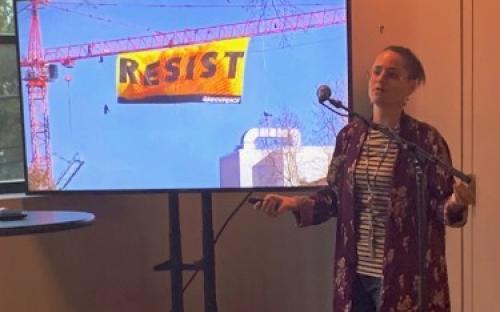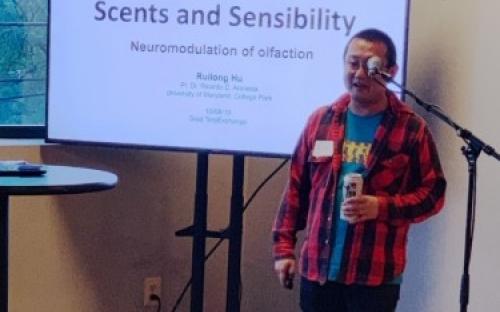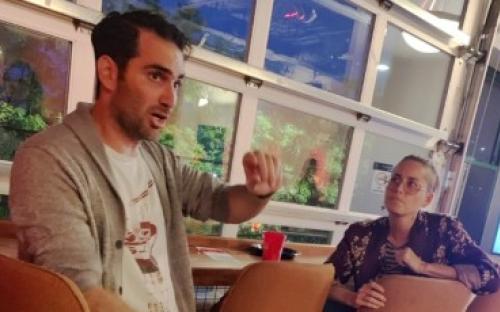By Laurie White
UMD graduate students who like a side of research with their happy hour found the perfect spot at Tuesday’s Grad Terp Exchange at Milkboy Arthouse.
Organized by Graduate School Director of Academic and Professional Development Linda Macri, the monthly series features three grad students, a stage and 20 minutes of research in a relaxed setting. October’s theme was “The Body.”
Psychology Postdoctoral Fellow Navot Naor presented his work on how the brain processes connections between emotions in a talk called “From the Serengeti to the Therapist’s Couch.”
“Going through the experience of presenting to a wide population forced me to focus on some key messages,” Naor said. “And clarify concepts, as I tried to avoid any sort of plots, activation maps, or jargon.”
Victoria Scrimer, PhD student in the Department of Theater, Dance and Performance Studies, shared her research on the intersection of activism and performance.
“Developing the presentation for a broad audience really forced me to boil down my work to its most essential points and think critically about what other people might find interesting or useful about what I'm working on,” she said.
As he prepares for job talks and presentations outside of his department, Neuroscience presenter and doctoral candidate Rui Hu also appreciated the opportunity to share his research on the link of olfactory nerves to perception and memory with a diverse audience.
“Since I have been and will continue to visit labs to give seminars outside of my field and the majority of the audience do not understand my technique, I figured it's a good opportunity to try and talk about my data in a broader context, and to try to highlight the key pieces of data I have that are truly important,” he said.
The GTE audience can ask questions after each presentation, a component that each presenter enjoyed.
“It was a really fun and interesting experience, and being able to have a discussion at the end was the most interesting part for me,” said Naor, who included an interactive video game component in his presentation.
Scrimer appreciated the opportunity to share her work in a low-stakes setting with a diverse audience.
“I was excited by the questions I received and thought the conversations I had with the other presenters from vastly different disciplines were more generative than I expected,” she said.
This interdisciplinary setting is a key factor in GTE, according to Macri.
“We hear from graduate students all the time that they are interested in interdisciplinary perspectives and conversations,” she said. “At the October GTE, students heard about--and engaged in dialogue about--performance studies and cognitive studies, about how activism in the US has--and hasn't--changed throughout our history and then about why our sense of smell matters and how our brains make sense of multiple demands and priorities.”
Scrimer is also a Writing Fellow in the Graduate School Writing Center, which provides an array of oral and written communication services, including its new Oral Communications lunchtime series.
“Although I've taught undergraduate courses on public speaking and presentation it was still really helpful to be able to run through a presentation with another person well-versed in public presentation” she said. “I highly recommend it to anyone who has an upcoming talk.
First-year Cybersecurity student Nestor Romero said he attended GTE out of curiosity. Although his program requires no research, Romero noted that he came to learn, and admired the deep knowledge of the speakers.
“They were obviously so knowledgeable about their topics and their fields, it allowed them to have some fun with the material and they could share it with others,” he said.
Romero sat with Dr. Susan Martin, Graduate School Director of Professional and Career Development, who believes that GTE is an opportunity to build connections outside of the classroom or lab.
“Grad students often say that they are uncomfortable with networking,” Martin said. “GTE is a great way to practice networking in a real low pressure environment. It is the perfect place to expand connections with other graduate students, faculty and staff.”
GTE also gives students early in their research fresh ideas about presenting it. First year Animal and Avian Sciences PhD student Chirantana Mathkari attended Grad Terp Exchange this summer, and enjoyed it so much she returned. She noted that Naor’s and Hui’s presentations especially helped her consider her own research in animal behavior and neurophysiology.
“I'd like to participate in the upcoming exchanges and maybe present a year down the line,” she said.
The relaxed, collegial environment at Milkboy Arthouse is a favorite of students trying to communicate complex concepts.
“Grad Terp Exchange is rejuvenation,” Martin said. ”The atmosphere promotes fun, learning, relaxation and new connections. We need more opportunities like this. It can't be all work in graduate school."
Hu concurs.
“I liked that it was at a bar so it was more relaxed and informal, and I could do it with a beer in my hand,” he said. “In the end, that's how science should be distributed.”
The November 12 GTE features the theme Overcoming Barriers, “in ways that you might not even think to apply that phrase,” Macri said. “If you are in graduate school because you find research compelling, you shouldn't miss coming to--or speaking at--GradTerp Exchange.”
If you're interested in sharing your research at a future GTE, apply here. Registration to attend the November event will open soon.




